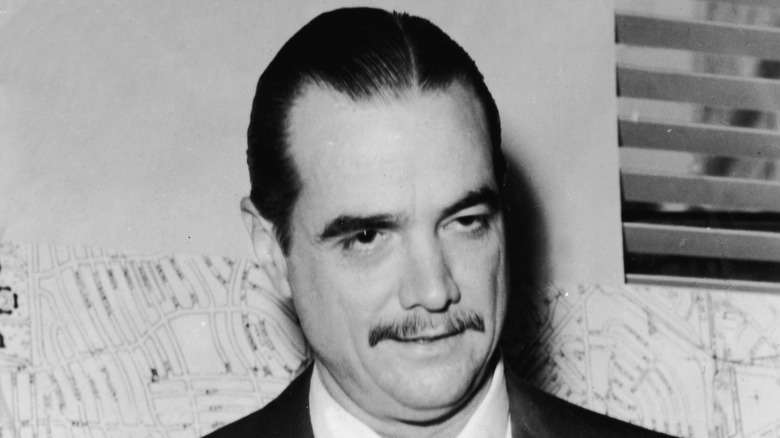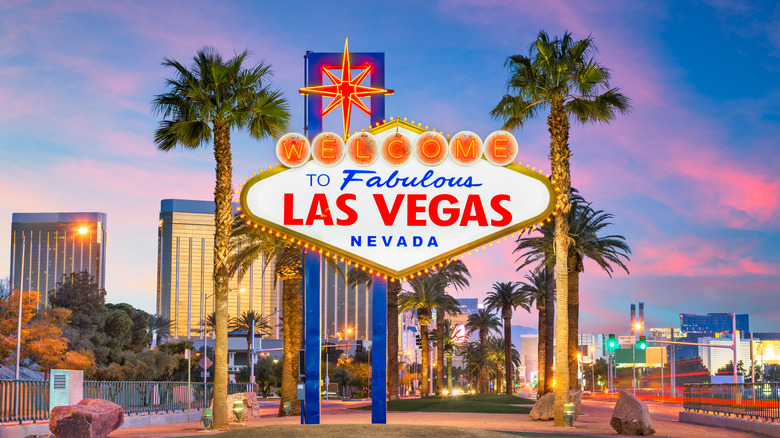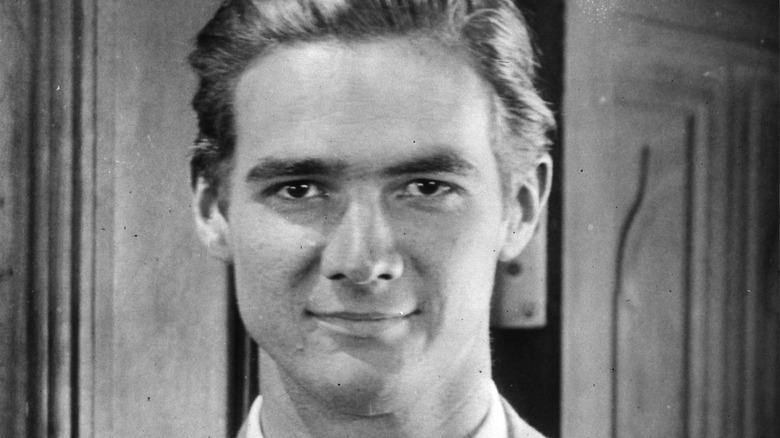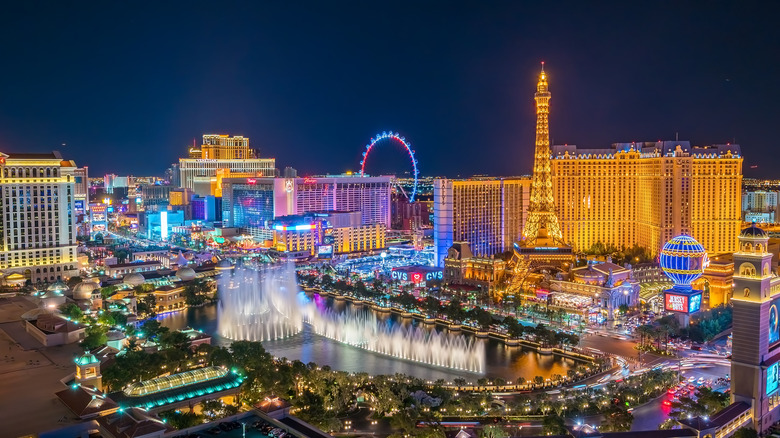Howard Hughes' Alleged Plot To Rule Las Vegas
American eccentric billionaire Howard Hughes is remembered these days mostly for his failed wooden airplane (the Spruce Goose) and for the bravura performance Leonardo DiCaprio turned in while portraying him in the 2004 film "The Aviator." Coming from a monied California family, according to Britannica, Hughes tried his hand at this and that, including filmmaking and aviation. He also famously lived out his years plagued by paralyzing germaphobia, so terrified of germs that he spent basically the remainder of his life in seclusion (via the American Psychological Association).
There was also the time he (more or less) tried to buy Las Vegas. While this is admittedly hyperbolic, as buying an entire city was outside of the purview of even a man of Hughes' wealth, he did buy a lot of it, according to the Review-Journal, and then he tried to throw his weight around so much that, in essence, he was trying to turn the town into his own miniature benevolent dictatorship. It didn't work, but even today Sin City bears the marks of a highly-motivated investor who, at the very least, succeeded in reshaping the city's image.
Two Las Vegases
For all intents and purposes, there have been "two" Las Vegases. Today's Vegas isn't exactly a family-friendly destination; after all, it's built entirely around gambling. But it's also a world-class tourist destination with award-winning shows (like Cirque du Soleil and the Blue Man Group), art galleries, world-class dining, and the like. Think of it as a Walt Disney World but for adults over 21, and with blackjack. The properties are owned and managed by corporations, with shareholders, executive boards, and CEOs.
However, the first Las Vegas — and here we mean the Las Vegas of casinos and shows and such, and not the whistle-stop desert town it once was before gambling came to town — was decidedly different. Put simply, as the Review-Journal reports, it was run by the mob, and that meant that much of what went on in and around the town was done in the way that you would expect the mob to do it. What happens in Vegas stays in Vegas, indeed.
The Las Vegans aren't ashamed of their mob past; rather, they own it. "We owe a debt of gratitude to the Mafia for developing Las Vegas, and there's nothing to be ashamed of. It was the mob that moved (Las Vegas) forward, with the good, the bad, and the ugly," said Nevada state archivist Guy Rocha.
Howard Hughes rolls into town
Howard Hughes didn't just wake up one day and decide on a whim to turn Las Vegas into his own personal fiefdom. As the Review-Journal reports, he flew into and out of town multiple times in the 1940s and 1950s. By 1953, he'd been putting into place plans to bring an industrial park to Southern Nevada, but those plans fell apart when his employees didn't want to move to a small patch of desert in the middle of nowhere.
In 1966, Hughes rolled into town in the most Howard Hughes way possible: by this time a famous recluse, he distracted onlookers by having a stretcher wheeled down the street. He was able to enter the Desert Inn unnoticed, where he took up residence in a penthouse suite. When the owner of the hotel tried to evict Hughes, the billionaire simply bought the place. Then he bought more land and properties. Then some more. Then more still.
He also tried to assume total control of the place. His agenda included trying to forbid rock concerts in Clark County, shielding himself from having to appear in any Nevada court, denying a gaming license to a competitor, and having near-total control of McCarran International Airport.
Then, in much the same way that he arrived, a few years later he skipped town, leaving his quarters via the fire escape.
Hughes' influence still hangs over Vegas
Why Hughes left town unannounced is a matter of whom you ask. As the Review-Journal reports, it may have been that the mob was not keen on his taking a cut out of their profits. Or perhaps he was put off by nuclear testing taking place down the road. Perhaps the feds had taken an interest in his activities. Either way, he was gone. Still, his shadow is still cast over Sin City.
Transitioning Las Vegas from a mob-owned Gomorrah to a corporate-owned tourist attraction was a decades-long process, according to Casino.org, accomplished bit by bit via legislation and business transactions. But Howard Hughes certainly played a role in that transition by bringing a sense of legitimacy to the casino industry. As a companion Review-Journal report notes, Hughes "changed the face of gaming when he bought the Desert Inn from its mob-connected owners and several other casinos on the Strip." That paved the way for corporate ownership of casinos, and today, corporations such as MGM and Harrah's are the big movers and shakers in Sin City, and not mob bosses like Bugsy Siegel or Moe Dalitz.



